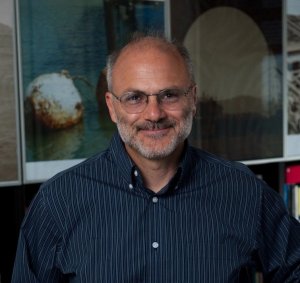 Winter Conference was led this year by Georgetown University’s Dr. Randy Bass. Dr. Bass gave a talk in the morning entitled “Higher Education and the Future of Human Learning.” In his talk, he spoke of what education needs to look like as we move into the future, pointing out that we need to design for “context not content.” He explained that “As machines get better at being machines, the primary purpose of higher education has to be helping humans get better at being human.” In other words, we need to find ways to develop robot-proof qualities like creativity and mental flexibility. This focus, he says, is the upper right quadrant that is the nexus of integrative and inclusive excellence, but we need to plan to get into this quadrant. He ended his talk by encouraging tables to discuss and develop lists of what qualities or competencies we most want to retain and develop at NMC in order to thrive and lead as an institution.
Winter Conference was led this year by Georgetown University’s Dr. Randy Bass. Dr. Bass gave a talk in the morning entitled “Higher Education and the Future of Human Learning.” In his talk, he spoke of what education needs to look like as we move into the future, pointing out that we need to design for “context not content.” He explained that “As machines get better at being machines, the primary purpose of higher education has to be helping humans get better at being human.” In other words, we need to find ways to develop robot-proof qualities like creativity and mental flexibility. This focus, he says, is the upper right quadrant that is the nexus of integrative and inclusive excellence, but we need to plan to get into this quadrant. He ended his talk by encouraging tables to discuss and develop lists of what qualities or competencies we most want to retain and develop at NMC in order to thrive and lead as an institution.
In the afternoon, Dr. Bass’s workshop was entitled, “Designing for High-Impact Integrative Experiential Learning.” He explained that we need to locate high impact practices both within the curriculum and outside it–in the “experiential co-curriculum.” Giving the example of his wife’s biology summer bridge course, he argued that the “signature paradigm for the future of higher education” is one in which domain knowledge, knowledge of the world, and knowledge of oneself all come together to create “a space of formation, transformation and whole student development.” He reminded us, too, that in that quadrant of inclusive and integrative excellence, the work needs to matter to the students. Additionally, he explained, the whole person matters, relationships matter, and deep engagement matters. Finally, he asked us to consider our course and program outcomes and work backwards from there. If we know that we want our students to become better at being human, then we need to ask ourselves what they need to be doing at each stage in order to reach that goal.
Dr. Bass kindly shared all of his slides with us. Here is the link to the slide show.

